This content originally appeared on Democracy Now! and was authored by Democracy Now!.
This post was originally published on Radio Free.
This content originally appeared on Democracy Now! and was authored by Democracy Now!.
This post was originally published on Radio Free.
This content originally appeared on Democracy Now! and was authored by Democracy Now!.
This post was originally published on Radio Free.
This content originally appeared on Democracy Now! and was authored by Democracy Now!.
This post was originally published on Radio Free.
This content originally appeared on Democracy Now! and was authored by Democracy Now!.
This post was originally published on Radio Free.
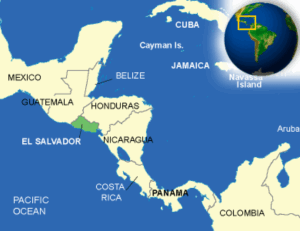 This article analyzes the emergence of Nayib Bukele as a political figure in El Salvador from a Marxist materialist perspective. Bukele’s ascent is the result of both the failure of capitalist neoliberalist policies and the lack of a working-class struggle instrument. The author concludes that the only alternative lies in constructing a democratic political movement to confront the authoritarian and populist discourse taking shape in El Salvador.
This article analyzes the emergence of Nayib Bukele as a political figure in El Salvador from a Marxist materialist perspective. Bukele’s ascent is the result of both the failure of capitalist neoliberalist policies and the lack of a working-class struggle instrument. The author concludes that the only alternative lies in constructing a democratic political movement to confront the authoritarian and populist discourse taking shape in El Salvador.
Like several countries around the world, El Salvador is experiencing an onslaught of extreme right-wing policies. The current government of Nayib Bukele rules the country under a crackdown, persecutes human rights defenders, concentrates power, passes bills to deepen the neoliberalist model imposed on the country, establishes a pedagogy of blind obedience to authority, and expresses its intention to grant natural resources to external companies. To understand this context, it is necessary to delve into the material forces that have shaped the economic and social landscape in El Salvador. I reject the ordinary thesis, which states that his communication apparatus can ultimately explain Bukele’s success. Without doubt, this factor plays an important role. However, it would be insufficient without the concrete and material conditions that prepared the soil for imposing a new authoritarian regimen.
These are times of sharp class struggle. After the dismantlement of the Soviet Union, the imperialist ruling class of the United States strove to impose a neoliberal model all over the world. We should make no mistake. The Soviet Union plays a vital role in Western capitalist societies, where the threat of communism served as a shield that prevented further deepening of the level of exploitation and oppression on the working classes, as ruling classes feared that they might develop anti-capitalist feelings. With the dismantlement of the Soviet Union, US imperialists got the free hand to launch the most ferocious crusade against the working class.
This is the true meaning of neoliberalism, the economic and social model promoted since the last decades of the 20th century. The neoliberal offensive intensified in the 90s and 2000s, dismantling the welfare state, privatizing basic services, and advancing labor policies aimed to ensure a more extreme level of exploitation of the working class. It was an open war waged by imperialists and the national bourgeoisie against the working class worldwide.
Salvadoran context
This depiction faithfully represents what happened in El Salvador. Ever since the nation’s foundation, this country has been characterized by a solid class structure, which gave birth to an oligarchy that during the 20th century ruled the country ruthlessly with the support of military forces and US imperialism. As a result, the Salvadoran working class rose in a popular war to overthrow this class’s rule and democratize the country. Nonetheless, the support of US imperialism to the government makes it challenging to reach this goal, and the conflict endured for twelve years.
In the early 90s, a peace agreement was signed between the Farabundo Marti Front for National Liberation (FMLN) guerrilla and the government. That former guerrilla was established as a political party from that moment, moving the struggle into the electoral stage. The national ruling class established a twofold strategy to prevent even the slightest possibility of a modest social change. On the one hand, it was about delaying an eventual government of the FMLN; on the other, taming the political party, making it an integral part of the system. The FMLN slowly adapted to the existing political circumstances and finally renounced its anti-oligarchist and anti-neoliberalist project.
In 2009, the FMLN won the electoral contest with an independent candidate, Mauricio Funes, a social democrat, who was later accused of corruption. This meant the final blow to any hope of social transformation. This way, the Salvadoran working class was betrayed, and what had until that moment been its main political instrument to resist the wave of aggressive neoliberal policies driven by imperialist and oligarchic forces was undermined.
Bukeles’ path to absolute power
Paradoxically, this occurred at the exact point when neoliberalism collapsed all over the world. Therefore, at the exact moment when more anti-neoliberal and anticapitalist sentiment were on the rise. At that very point, the FMLN capitulated to neoliberalism, consummating its betrayal, now as a tamed ruling party. Ironically, just as the party reached its highest point and surveyed the landscape from the peaks of power, everything began to crumble. What neither the traditional oligarchy nor the imperial forces could do, namely, the party destruction, Bukeles did by weaponizing it from within.
Bukele emerged as an opportunist figure from the very beginning. He became a politician affiliated with the FMLN. He grew by utilizing a communicational campaign to construct the image of a youthful, new figure capable of maintaining a distance from the very same party he was a member of. Bukele’s strategy exploited the population’s discontent with traditional political parties, which aligned with the neoliberal system and did not represent the feelings and interests of the working class. It is class struggle, therefore, that primarily explains Bukele’s success. At that time, the political balance was tipping toward the left because people were ready to support an alternative party to take them out of capitalism and their horrors. Relying on his popularity, Bukele manipulated the FMLN to nominate him as a presidential candidate. When the party refused, he precipitated his own expulsion, knowing this would put it in an advantageous position from the viewpoint of the population, who would feel identified with a figure who had just become a victim of a political system people despised.
When Bukele was expelled from his former political party, he strove to promote the image of a radical progressive politician, promoting full democratization, which includes creating an absolute horizontal social movement, as well as social policies such as taxing the wealthy, lifting the national educational budget, and even creating more public universities. He also created a new local development ministry to support abandoned communities. In its first public intervention as an independent figure, it vindicated Shafik Handal, the historic leader of FMLN and former guerrilla commander. In short, Bukele appealed to left-wing forces. My hypothesis here is that this appeal had two purposes: on the one hand, to present himself as an alternative to neoliberal politics, which people were tired of, and on the other hand, and more importantly, to attract the electoral base of the FMLN, its former party, which he aimed to destroy.
Still, from the onset, his policies were far from progressive, let alone radical. He held a sovereigntist discourse while flirting with right-wing figures like Elon Musk. Therefore, Bukele was a split figure from the very beginning. My point here is that this split should not be located in the incoherence of his figure but is a mirror of a material split, namely, class struggle: to consolidate his power, Bukele needed to appeal to the interests of the working class. Initially, this implies stealing old vindications that people have longed for decades, the same vindications raised in the civil world, namely, social justice and genuine democracy. Once Bukele consolidates his power, he could play the traditional populist game and openly embrace the neoliberal language.
There is a way out through class struggle
This analysis shows that the current political moment in El Salvador can only be understood by a materialist analysis that considers the class dynamics. Bukele’s figure emerges to fill a void, resulting from the neglect of the working class by the FMLN. Salvadoran people launched a war to democratize the country and change its class structure. Finally, after 12 long years of war and a failed democratization period, people grew tired of so-called neoliberal democracy. The post-peace agreement period was perceived as a farce. In this context, the demagogy grew, presenting itself as a different solution.
The opposition’s main problem in El Salvador is that they are limited to denouncing the dismantlement of the democratic system; they forget that democracy was never a reality for the masses. We need a force capable of seeing beyond the ideological veil of capitalism. One of the key insights of Marx’s political thought was his depiction of capitalism’s tendency toward its own disintegration. Constant economic and political crises characterize capitalism. Marx viewed the construction of a communist party as essential to advancing historical progress. A key lesson of the Communist Manifesto is that without communism, capitalist disintegration can only lead to new ways of social and moral decay. Therefore, Marxism represents the most potent instrument through which the working class can confront the crisis of capitalism and the political monstrosities generated by its decline. The only viable course is the construction of a working-class party, the organization of the masses, and a united struggle against the resurgence of fascist forces.
The post Nayib Bukele and the Working-Class Struggle in El Salvador first appeared on Dissident Voice.This post was originally published on Dissident Voice.
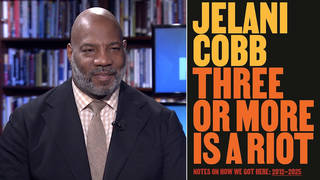
Jelani Cobb, the acclaimed journalist and dean of the Columbia Journalism School, has just published a new collection of essays, “Three or More Is a Riot: Notes on How We Got Here.” The book collects essays beginning in 2012 with the killing of Travyon Martin in Florida. It traces the rise of Donald Trump and the right’s growing embrace of white nationalism as well as the historic racial justice protests after the police killing of George Floyd in 2020. “What we’re seeing is a kind reactionary push to try to return the nation to the status quo ante, to undo the kind of demographic change, literally at gunpoint, as we are pushing people of color out of the country by force,” says Cobb.
This content originally appeared on Democracy Now! and was authored by Democracy Now!.
This post was originally published on Radio Free.
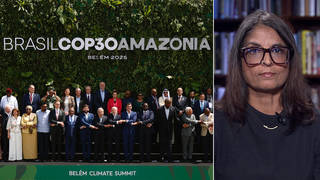
Over 5000 fossil fuel lobbyists were given access to U.N. climate summits over the past four years, a period marked by a rise in catastrophic extreme weather, adequate climate action and record oil and gas expansion. “This is climate obstruction at work,” says Nina Lakhani, senior climate justice reporter for The Guardian US. She notes that lobbyists attend climate conferences to “promote false solutions like carbon based carbon markets, carbon capture and storage — these market based solutions which are not going to save the planet.”
This content originally appeared on Democracy Now! and was authored by Democracy Now!.
This post was originally published on Radio Free.
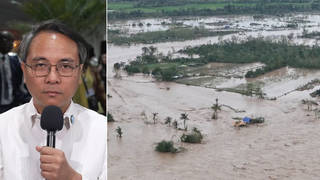
The 30th U.N. climate change conference begins today in the Brazilian rainforest city of Belem, located at the mouth of the Amazon River. The summit opens as a major typhoon hit the Philippines killing at least eight people and displacing more than 1.4 million others. Typhoon Fung-wong hit as the Philippines is still recovering from Typhoon Kalmaegi which killed at least 224 people last week. Democracy Now! speaks with former Philippine climate negotiator Yeb Saño, chair of the Laudato Si’ Movement, who warns that global steps to stop the climate crisis are “too little and probably too late.”
This content originally appeared on Democracy Now! and was authored by Democracy Now!.
This post was originally published on Radio Free.
Democracy Now! Monday, November 10, 2025
This content originally appeared on Democracy Now! Audio and was authored by Democracy Now!.
This post was originally published on Radio Free.
This content originally appeared on Democracy Now! and was authored by Democracy Now!.
This post was originally published on Radio Free.
This content originally appeared on Democracy Now! Audio and was authored by Democracy Now!.
This post was originally published on Radio Free.
This content originally appeared on Democracy Now! for Broadcasters – HD MP4 and was authored by Democracy Now! for Broadcasters – HD MP4.
This post was originally published on Radio Free.
ANALYSIS: By Craig McCulloch, RNZ News acting political editor
As the Iwi Chairs Forum fought fruitlessly to keep Te Pāti Māori together last week, spokesperson Bayden Barber offered a warning: a split tōtara is only good for the fire.
Now Te Pāti Māori finds itself in an inferno.
The slow-burn conflagration in Aotearoa New Zealand has been smouldering for so long, it’s easy to miss the magnitude. But this is no small matter.
This is a party ousting a third of its caucus, citing “irreconcilable differences” and “serious breaches” of its constitution.
Fronting reporters today, co-leaders Debbie Ngarewa-Packer and Rawiri Waititi wished their former colleagues “all the best of luck” and waved them on their way.
“We had to bring this to a close, and we must move on.”
But that seems overly hopeful. Both Mariameno Kapa-Kingi and Tākuta Ferris were quick to declare the move “unconstitutional” and are threatening to challenge it “in all respects”.
Waka-jumping provision
The party’s National Council has also yet to consider whether to invoke the waka-jumping provision and eject the MPs from Parliament altogether.
Te Pāti Māori co-leaders announce MPs’ expulsion Video: RNZ News
That would require agreement of the two other remaining MPs — Hana-Rawhiti Maipi-Clarke and Oriini Kaipara. It’s unclear yet where they stand in all this.
Either outcome is ugly. If the “rogue” MPs remain, they will serve as a constant reminder of division. If they are booted, two byelections loom, sure to be bitter and bruising.
At least a public contest might shed more clarity on what’s behind the weeks of infighting, with voters so far largely left in a cloud of smoke.
Asked to clarify on Monday exactly what the MPs had done to deserve expulsion, the co-leaders refused: “You’re not going to get that detail here in this press conference.”
From what has dripped out over the past six weeks, it seems the feud is driven more by personality than principle.
Party president John Tamihere has accused the two MPs of plotting a failed coup. Kapa-Kingi and Ferris have declared no confidence in Tamihere, with their supporters decrying toxic dictatorial leadership.
Past wave of unity
Supporters are right to feel aggrieved. A year ago, Te Pāti Māori was riding a wave of unity and purpose, as a driving force behind the historic Toitū Te Tiriti hikoi.

It boasted its largest-ever caucus, having swept six of the seven Māori electorates in a dominant 2023 result.
Ironically, the roots of the recent crisis lie in that rapid expansion.
The co-leaders went from being a dynamic duo to overseeing a more assertive caucus and competing egos.
Tamihere, Ngarewa-Packer and Waititi are all dominant personalities, used to steering their own course.
But both Kapa-Kingi and Ferris regard themselves as electorate MPs first, answerable to their own people, not to the central hierarchy.
Add in the whānau ties on either side, and the conflict shifts from political to personal.
Party’s brand damaged
The co-leaders admit the recent disunity has damaged the party’s brand. The enthusiasm of a year ago has turned to disillusionment, with voters now forced to pick sides or to look elsewhere.
When Hone Harawira split from the Māori Party in 2011 to form Mana, both sides eventually vanished. Harawira was sent packing by voters in 2014, and the rest of the Māori Party followed in 2017.
For the wider opposition, there is good and bad here.
The Labour Party will see an opportunity to win over those disenchanted voters and to retake the Māori electorates amidst a more divided race.
But the wider picture is riskier. Centrist voters may well look at the turmoil on the left and decide to stick with the status quo.
Labour leader Chris Hipkins has yet to publicly declare whether he would welcome Te Pāti Māori as part of a future Cabinet.
Those questions will only grow louder now — expanding to include the “rogues”. Where do they stand in any coalition calculation?
The Iwi Chairs Forum had arranged “peace talks” this week, bringing together the two factions at a Wellington marae.
Bayden Barber still thinks that would be beneficial and the co-leaders agree it could still go ahead. But few expect much to come of it now.
The next moment of reckoning may come on December 7, when members gather in Rotorua for the party’s AGM — and confront how Te Pāti Māori can piece itself together from the ashes.
This article is republished under a community partnership agreement with RNZ.
This post was originally published on Asia Pacific Report.
This content originally appeared on Democracy Now! and was authored by Democracy Now!.
This post was originally published on Radio Free.
Asia Pacific Report
In an open letter released at the Belém Climate Summit, special envoys for strategic regions have expressed their support for the COP30 presidency and for all leaders committed to advancing climate crisis action.
Former New Zealand prime minister Dame Jacinda Ardern, the “voice” for Oceania, was among the seven climate envoys signing the letter.
The document acknowledges the progress achieved through the Paris Agreement and the Dubai Consensus, while underscoring the need for further advances “in light of the Global Stocktake” and warning of the growing challenge posed by climate disinformation.

The text calls for unity and concrete action to bridge the “triple gap” between climate finance, adaptation, and mitigation.
These bottlenecks, it emphasised, could not be resolved solely through revisions to Nationally Determined Contributions (NDCs), but required tangible policy measures.
The Baku to Belém Roadmap is highlighted as a vehicle for developing innovative solutions to unlock large-scale investments while reducing financing costs.
In addressing the spread of climate disinformation, the special envoys underlined the need for coordinated responses, collective strategies, and reinforced regulatory frameworks.
The letter was signed by Special Envoys Adnan Z. Amin (Middle East), Arunabha Ghosh (South Asia), Carlos Lopes (Africa), Jacinda Ardern (Oceania), Jonathan Pershing (North America), Laurence Tubiana (Europe), and Patricia Espinosa (Latin America and the Caribbean).
The open letter to leaders in Belém and to the COP30 presidency from the special envoys for strategic regions
We, the Special Envoys for our respective regions, wish to express our strong support for the Brazilian Presidency and all leaders committed to climate action at Belém.
COP30 presents both a significant opportunity and a profound challenge. To remain aligned with the ambition of the Paris Agreement amidst an increasingly complex geopolitical environment, we must demonstrate decisive progress. Multilateralism, grounded in international law and guided by the Paris Agreement, remains our most effective framework.
A clear signal from COP30 that the international community stands united in its determination to confront climate change will resonate globally. Our shared commitment to fully implement the Paris Agreement is the strongest collective response to a crisis that is disproportionately affecting vulnerable households and countries, devastating lives, livelihoods, and the ecosystems upon which we all depend.
We should also recognise the progress achieved since the Paris Agreement in 2015. The rapid growth of clean solutions is bending the trajectory of global emissions; where we had been on track to exceed a devastating temperature increase of more than 4°C, we are now able to project a level of less than 2.5°C.
But we need greater progress. We are not on track to achieve the goals of the Paris Agreement, and in particular, we are taking insufficient action to keep 1.5°C within reach, or even enough to keep warming well below 2°C. And every tenth of a degree of additional warming will mean harsh consequences for the world.
COP30 must acknowledge and address the “triple gap” in mitigation, adaptation and finance. Doing so requires an accelerated effort across the next decade, mobilising the full range of tools, resources, and partnerships available to us. This is at the heart of the goal of COP30: to advance the full implementation of both the Paris Agreement and the UAE Consensus, informed by the Global Stocktake presented at COP28 in Dubai.
To accelerate progress, we must maintain a laser focus on concrete, coordinated action.
The Action Agenda is a powerful reservoir of those actions, which must be structured, monitored, and supported for effective delivery. Addressing the gap should not be understood solely as revising Nationally Determined Contributions (NDCs), but rather as translating ambition into policies that enable each country to overperform on its existing commitments. And the policies we take, as has been amply demonstrated in our successes to date, can marry not only climate benefits, but also contribute to growing our economies, promote our national security, improve the welfare of our citizens, and promote a healthy environment.
Tripling global renewable energy capacity is a goal within reach. Collectively, we have the
technology and resources: what is required now is scaled investment in all regions. The Baku to Belém roadmap to mobilise US$1.3 trillion annually for developing countries outlines both established and innovative solutions to deliver investment at scale at reduced costs of finance. To operationalise it, clear milestones, mandates, and responsibilities are needed.
Ministers of finance should take the lead in defining the priorities. Creating fiscal space, minimizing debt burdens, effectively mobilising domestic and international finance, and
ensuring enabling policy environments, alongside increased investment in the Global South,
are all essential to making this roadmap credible and implementable.
Strengthening resilience and adaptation are equally critical. Climate impacts are increasingly a major barrier to sustainable economic and social development. We must work together to define the indicators that do not impose resource-intensive reporting burdens but instead help our economies and societies adapt to their local circumstances and become resilient.
We must engage the insurance sector, central banks, and private investors to close the
protection gap that threatens long-term developmental gains.
Countries pursuing the transition away from fossil fuels should define roadmaps, in line with their national circumstances, while fostering dialogue between producers and buyers of fossil fuels. Roadmaps to end deforestation and restore ecosystems are equally necessary. Taken together, these pathways can allow countries to implement the long-term strategies submitted in previous years.
For the first time, COP30 will also confront the challenge of climate disinformation: a growing threat that undermines public trust and policy implementation. Combatting this challenge requires coordinated approaches, shared strategies, and strengthened regulatory
cooperation. We must shine the spotlight on our collective progress, in general, but also cases in particular where countries have met their climate targets ahead of schedule,
demonstrating a positive bias for action.
Lastly, we need an evolution of the climate regime that makes implementation more effective and inclusive. Progress depends on joining forces with the local authorities, economic sectors, governments, and civil society. Subnational leaders, from governors, to regional authorities, mayors, and community representatives, must be empowered to reinforce and complement NDCs and National Adaptation Plans (NAPs). COP30 is the moment to have them at the table and to craft a new approach that brings all relevant actors together in a global effort to safeguard our common future.
It is the moment to remind ourselves of the need for solidarity, and to recognise our agency — we have it within our power to change the future for the better.
Signed:
Adnan Z. Amin (Special Envoy for Middle East), chair, World Energy Council; CEO of COP28; former director-general, International Renewable Energy Agency
Arunabha Ghosh (Special Envoy for South Asia), founder-CEO, Council on Energy, Environment and Water
Carlos Lopes (Special Envoy for Africa), chair, Africa Climate Foundation; former executive
secretary, UN Economic Commission for Africa
Jacinda Ardern (Special Envoy for Oceania), former Prime Minister of New Zealand
Jonathan Pershing (Special Envoy for North America); former US Special Envoy for Climate Change
Laurence Tubiana (Special Envoy for Europe), dean, Paris Climate School; CEO, European
Climate Foundation; former French Special Envoy for Climate Change
Patricia Espinosa (Special Envoy for Latin America and the Caribbean), former executive
secretary, UN Framework Convention on Climate Change
This post was originally published on Asia Pacific Report.
The socialist Your Party is starting to take shape, with regional assemblies taking place across the country. Zarah Sultana is one of seven MPs in the fledgling political movement, and she’s been vocal on what shape the party’s internal democracy should take. In aid of that, she’s now posted 12 proposals:
I’ve always fought — and always will — for maximum member democracy.
If you believe Your Party should be explicitly socialist, radically democratic, rooted in mass movement and led by our members, not MPs — join me and back these democratic demands:
(1/3) pic.twitter.com/Z4vXBdzETx
— Zarah Sultana MP (@zarahsultana) November 8, 2025
Sultana’s proposals include:
Featured image via Twitter / X
By Willem Moore
This post was originally published on Canary.
Asia Pacific Report
A Pacific people’s mission to Kanaky New Caledonia was repeatedly confronted with a “profound sense of distrust” in the French state’s role in the decolonisation process, a new report released this week has revealed.
“This scepticism, articulated by Kanak representatives, is rooted in the belief that France is not a neutral arbiter but a key actor in perpetuating the conflict,” said the mission, which concluded that the French management of the territory continued to undermine the Kanak right to self-determination and breached international commitments on decolonisation.
As one speaker cited in the report explained:”France is acting like a referee, but instead they are the main perpetrator.”
The mission — led by the Pacific Network on Globalisation (PANG), the Pacific Conference of Churches (PCC) and the Protestant Church of Kanaky New Caledonia (Église protestante de Kanaky Nouvelle-Calédonie, EPKNC) — was conducted on April 10-19 this year following invitations from customary and church leaders.
Its findings, released last Wednesday by PANG, reveal persistent inequality, systemic discrimination, and political interference under the French administration. The report said that France’s role in Kanaky’s long-delayed decolonisation process had deepened mistrust and weakened the foundations of self-rule.
“The Pacific Mission in Kanaky New Caledonia is a reminder of our Pasifika connection with our families across the sea,” said Pastor Billy Wetewea of the EPKNC.
“It shows that we never exist alone but because of others, and that we are all linked to a common destiny. The journey of the Kanak people toward self-determination is a journey shared by every people in our region still striving to define their own future.”
The delegation included Anna Naupa (Vanuatu — the mission head), Lopeti Senituli (Tonga), Dr David Small (Aotearoa New Zealand), Emele Duituturaga-Jale (Fiji), with secretariat support by PANG and Kanak partners.
The team met community leaders, churches, women’s groups and youth networks across several provinces to document how the effects of French rule continue to shape Kanaky’s political, economic and social life.
Key findings
The Pacific Peoples’ Mission Report identifies four main areas of concern:
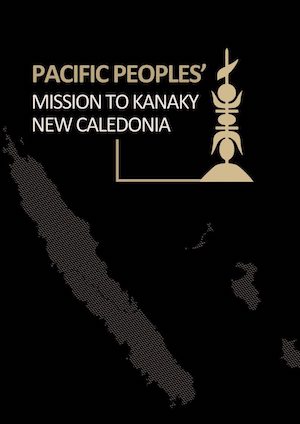
Kanak writer and activist Roselyne Makalu said the report documented the lived experiences of her people.
“This support is fundamental because, as the Pacific family, we form one single entity united by a common destiny,” she said.
“The publication of this report, which constitutes factual evidence of human-rights violations and the denial of the Kanak people’s right to decide their future, comes at the very moment the French National Assembly has voted, against popular opinion, to postpone the provincial elections.
“This Parisian decision is nothing short of a blatant new attack on the voice of the Caledonian people, intensifying the political deadlock.”
Tongan law practitioner and former president of the Tonga Law Society, Lopeti Senituli, who was a member of the mission, said the findings confirmed a deliberate system of control, adding that “the deep inequalities faced by Kanak people — from land loss and economic marginalisation to mass incarceration — are not accidents of history”.
“They are the direct outcomes of a system designed to keep Kanaky dependent,” he added.
‘Politics of revenge’
Head of mission Anna Naupa said France could not act as both referee and participant in the decolonisation process.
“Its repeated breaches, political interference and disregard for Kanak rights expose a system built to protect colonial interests, not people,” she said.
“The mission called for immediate action — the release of political prisoners, fair provincial elections, and a Pacific-led mediation process to restore trust and place Kanaky firmly on the path to self-determination and justice.”
The mission also confirmed that the May 2024 crisis was an uprising by those most affected by France’s flawed governance and economic model.
It described France’s post-crisis policies — including scholarship withdrawals, fare increases, and relocation of public services — as “politics of revenge” that had further harmed Kanak and Oceanian communities.
Recommendations
The mission calls for:
• Free and fair provincial elections under neutral international observation;
• A new round of negotiations to be held to find a new political agreement post Nouméa Accord; and
• Pacific-led mediation through the Melanesian Spearhead Group (MSG) and the Pacific Islands Forum (PIF).
The report further urges Pacific governments to ensure Kanaky remains on the United Nations list of Non-Self-Governing Territories and to revitalise regional solidarity mechanisms supporting self-determination and justice.
“The world is already in the fourth international decade of decolonisation,” the report concludes.
“Self-determination is an inalienable right of colonised peoples. Decolonisation is a universal issue — not a French internal matter.”
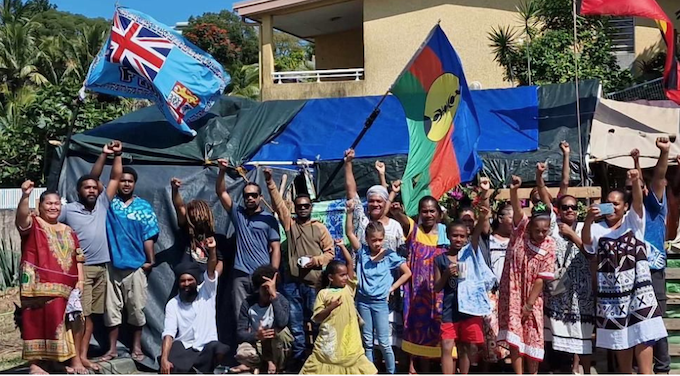
This post was originally published on Asia Pacific Report.
Asia Pacific Report
A Pacific people’s mission to Kanaky New Caledonia was repeatedly confronted with a “profound sense of distrust” in the French state’s role in the decolonisation process, a new report released this week has revealed.
“This scepticism, articulated by Kanak representatives, is rooted in the belief that France is not a neutral arbiter but a key actor in perpetuating the conflict,” said the mission, which concluded that the French management of the territory continued to undermine the Kanak right to self-determination and breached international commitments on decolonisation.
As one speaker cited in the report explained:”France is acting like a referee, but instead they are the main perpetrator.”
The mission — led by the Pacific Network on Globalisation (PANG), the Pacific Conference of Churches (PCC) and the Protestant Church of Kanaky New Caledonia (Église protestante de Kanaky Nouvelle-Calédonie, EPKNC) — was conducted on April 10-19 this year following invitations from customary and church leaders.
Its findings, released last Wednesday by PANG, reveal persistent inequality, systemic discrimination, and political interference under the French administration. The report said that France’s role in Kanaky’s long-delayed decolonisation process had deepened mistrust and weakened the foundations of self-rule.
“The Pacific Mission in Kanaky New Caledonia is a reminder of our Pasifika connection with our families across the sea,” said Pastor Billy Wetewea of the EPKNC.
“It shows that we never exist alone but because of others, and that we are all linked to a common destiny. The journey of the Kanak people toward self-determination is a journey shared by every people in our region still striving to define their own future.”
The delegation included Anna Naupa (Vanuatu — the mission head), Lopeti Senituli (Tonga), Dr David Small (Aotearoa New Zealand), Emele Duituturaga-Jale (Fiji), with secretariat support by PANG and Kanak partners.
The team met community leaders, churches, women’s groups and youth networks across several provinces to document how the effects of French rule continue to shape Kanaky’s political, economic and social life.
Key findings
The Pacific Peoples’ Mission Report identifies four main areas of concern:

Kanak writer and activist Roselyne Makalu said the report documented the lived experiences of her people.
“This support is fundamental because, as the Pacific family, we form one single entity united by a common destiny,” she said.
“The publication of this report, which constitutes factual evidence of human-rights violations and the denial of the Kanak people’s right to decide their future, comes at the very moment the French National Assembly has voted, against popular opinion, to postpone the provincial elections.
“This Parisian decision is nothing short of a blatant new attack on the voice of the Caledonian people, intensifying the political deadlock.”
Tongan law practitioner and former president of the Tonga Law Society, Lopeti Senituli, who was a member of the mission, said the findings confirmed a deliberate system of control, adding that “the deep inequalities faced by Kanak people — from land loss and economic marginalisation to mass incarceration — are not accidents of history”.
“They are the direct outcomes of a system designed to keep Kanaky dependent,” he added.
‘Politics of revenge’
Head of mission Anna Naupa said France could not act as both referee and participant in the decolonisation process.
“Its repeated breaches, political interference and disregard for Kanak rights expose a system built to protect colonial interests, not people,” she said.
“The mission called for immediate action — the release of political prisoners, fair provincial elections, and a Pacific-led mediation process to restore trust and place Kanaky firmly on the path to self-determination and justice.”
The mission also confirmed that the May 2024 crisis was an uprising by those most affected by France’s flawed governance and economic model.
It described France’s post-crisis policies — including scholarship withdrawals, fare increases, and relocation of public services — as “politics of revenge” that had further harmed Kanak and Oceanian communities.
Recommendations
The mission calls for:
• Free and fair provincial elections under neutral international observation;
• A new round of negotiations to be held to find a new political agreement post Nouméa Accord; and
• Pacific-led mediation through the Melanesian Spearhead Group (MSG) and the Pacific Islands Forum (PIF).
The report further urges Pacific governments to ensure Kanaky remains on the United Nations list of Non-Self-Governing Territories and to revitalise regional solidarity mechanisms supporting self-determination and justice.
“The world is already in the fourth international decade of decolonisation,” the report concludes.
“Self-determination is an inalienable right of colonised peoples. Decolonisation is a universal issue — not a French internal matter.”

This post was originally published on Asia Pacific Report.
I’ve recently finished reading the latest James Douglass exceptional historical treasure entitled Martyrs to the Unspeakable: The Assassinations of JFK, Malcolm, Martin, and RFK. Having previously read his remarkable book JFK and the Unspeakable I had a good clue what to expect from this new undertaking.
I was not disappointed as I read this excellent recounting of our government’s deceit, arrogance, murderous past, wars, and denial of democracy.
I am certain that any person wishing to understand our current political situation will greatly benefit from reading this monumental recounting.
The post Recounting The Government’s Deceit, Murders And Denial Of Democracy appeared first on PopularResistance.Org.
This post was originally published on PopularResistance.Org.
Just one month before the November 30 vote for a new President of Honduras, as reported by Progressive International, leaked recordings unveiled a plot to manipulate logistics on election day, create chaos, and invite the US embassy to declare someone other than Rixi Moncada as the victor. Moncada, the governing party candidate, is leading by 14 percentage points in recent polls.
As the government applies the Constitution to protect the votes of the Honduran people, it finds itself obliged to take measures that are easily criticized if viewed out of context.
The post Honduras Under Increasing Threat As Election Nears appeared first on PopularResistance.Org.
This post was originally published on PopularResistance.Org.
Just one month before the November 30 vote for a new President of Honduras, as reported by Progressive International, leaked recordings unveiled a plot to manipulate logistics on election day, create chaos, and invite the US embassy to declare someone other than Rixi Moncada as the victor. Moncada, the governing party candidate, is leading by 14 percentage points in recent polls.
As the government applies the Constitution to protect the votes of the Honduran people, it finds itself obliged to take measures that are easily criticized if viewed out of context.
The post Honduras Under Increasing Threat As Election Nears appeared first on PopularResistance.Org.
This post was originally published on PopularResistance.Org.
Just one month before the November 30 vote for a new President of Honduras, as reported by Progressive International, leaked recordings unveiled a plot to manipulate logistics on election day, create chaos, and invite the US embassy to declare someone other than Rixi Moncada as the victor. Moncada, the governing party candidate, is leading by 14 percentage points in recent polls.
As the government applies the Constitution to protect the votes of the Honduran people, it finds itself obliged to take measures that are easily criticized if viewed out of context.
The post Honduras Under Increasing Threat As Election Nears appeared first on PopularResistance.Org.
This post was originally published on PopularResistance.Org.
Just one month before the November 30 vote for a new President of Honduras, as reported by Progressive International, leaked recordings unveiled a plot to manipulate logistics on election day, create chaos, and invite the US embassy to declare someone other than Rixi Moncada as the victor. Moncada, the governing party candidate, is leading by 14 percentage points in recent polls.
As the government applies the Constitution to protect the votes of the Honduran people, it finds itself obliged to take measures that are easily criticized if viewed out of context.
The post Honduras Under Increasing Threat As Election Nears appeared first on PopularResistance.Org.
This post was originally published on PopularResistance.Org.
Just one month before the November 30 vote for a new President of Honduras, as reported by Progressive International, leaked recordings unveiled a plot to manipulate logistics on election day, create chaos, and invite the US embassy to declare someone other than Rixi Moncada as the victor. Moncada, the governing party candidate, is leading by 14 percentage points in recent polls.
As the government applies the Constitution to protect the votes of the Honduran people, it finds itself obliged to take measures that are easily criticized if viewed out of context.
The post Honduras Under Increasing Threat As Election Nears appeared first on PopularResistance.Org.
This post was originally published on PopularResistance.Org.
Just one month before the November 30 vote for a new President of Honduras, as reported by Progressive International, leaked recordings unveiled a plot to manipulate logistics on election day, create chaos, and invite the US embassy to declare someone other than Rixi Moncada as the victor. Moncada, the governing party candidate, is leading by 14 percentage points in recent polls.
As the government applies the Constitution to protect the votes of the Honduran people, it finds itself obliged to take measures that are easily criticized if viewed out of context.
The post Honduras Under Increasing Threat As Election Nears appeared first on PopularResistance.Org.
This post was originally published on PopularResistance.Org.
Just one month before the November 30 vote for a new President of Honduras, as reported by Progressive International, leaked recordings unveiled a plot to manipulate logistics on election day, create chaos, and invite the US embassy to declare someone other than Rixi Moncada as the victor. Moncada, the governing party candidate, is leading by 14 percentage points in recent polls.
As the government applies the Constitution to protect the votes of the Honduran people, it finds itself obliged to take measures that are easily criticized if viewed out of context.
The post Honduras Under Increasing Threat As Election Nears appeared first on PopularResistance.Org.
This post was originally published on PopularResistance.Org.
Just one month before the November 30 vote for a new President of Honduras, as reported by Progressive International, leaked recordings unveiled a plot to manipulate logistics on election day, create chaos, and invite the US embassy to declare someone other than Rixi Moncada as the victor. Moncada, the governing party candidate, is leading by 14 percentage points in recent polls.
As the government applies the Constitution to protect the votes of the Honduran people, it finds itself obliged to take measures that are easily criticized if viewed out of context.
The post Honduras Under Increasing Threat As Election Nears appeared first on PopularResistance.Org.
This post was originally published on PopularResistance.Org.
Asia Pacific Report
New Zealand Pro-Palestine protesters gathered at West Auckland’s Te Pai Park today, celebrating successes of the BDS movement against apartheid Israel while condemning the failure of the country’s coalition government to impose sanctions against the pariah state.
“They’ve done nothing,” said Neil Scott, secretary of the Palestine Solidarity Network Aotearoa (PSNA), noting that some 35 protests were taking place across the motu this weekend and some 4000 rallies had been held since Israel began its war on Gaza in October 2023.
He outlined successes of the global BDS Movement and explained now New Zealanders could keep up the pressure on the NZ government and on the Zionist state that had been “systematically” breaching the US-brokered “ceasefire” in Gaza.
The criticisms followed the condemnation of New Zealand’s stance last week by the secretary-general of the global human rights group Amnesty International, Agnès Callamard, who said the government had a “Trumpian accent” and had remained silent on Gaza.
“Internationally, we don’t hear New Zealand. We haven’t heard New Zealand on some of the fundamental challenges that we are confronting, including Israel’s genocide, Palestine or climate,” she said in a RNZ radio interview.
Te Atatu MP Phil Twyford also spoke at the Te Pai Park rally, saying that the government was “going backwards” from the country’s traditional independent foreign policy and that it was “riddled with Zionists”.
After the rally, protesters marched on the local McDonalds franchise. McDonalds Israel is accused of supporting the IDF (Israeli Defence Forces) genocidal crimes in Gaza by supplying free meals to the military, prompting a global BDS boycott.
Türkiye arrest warrants for Israelis
Meanwhile, Türkiye has issued arrest warrants for Israeli Prime Minister Benjamin Netanyahu, and 36 other suspects over Gaza genocide charges
Israel, under Netanyahu, has killed close to 69,000 people, mostly women and children, and wounded more than 170,600 others in the genocide in Gaza since October 2023.
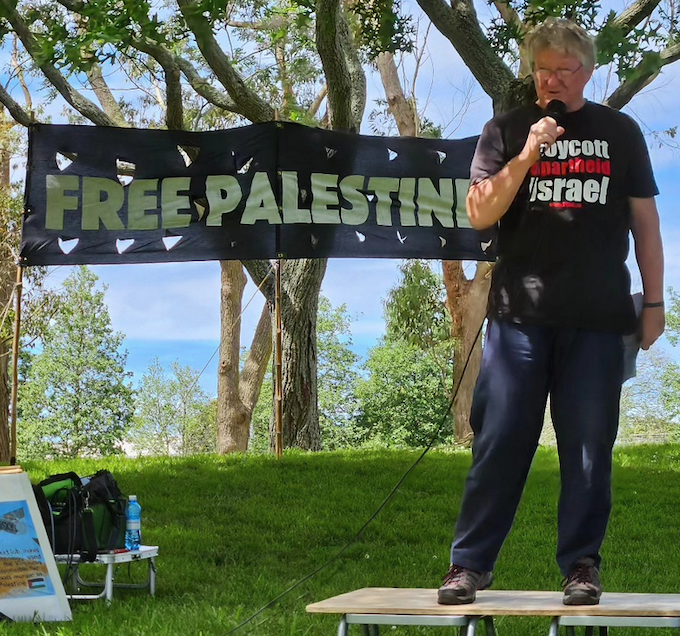
TRT World News reports that the Istanbul Chief Public Prosecutor’s Office said yesterday it had issued arrest warrants for 37 suspects, including Netanyahu, on charges of “genocide” in Gaza.
In a statement, the Prosecutor’s Office said the warrants were issued after an extensive investigation into Israel’s “systematic” attacks on civilians in Gaza, which it described as acts of genocide and crimes against humanity.
The probe was launched following complaints filed by victims and representatives of the Global Sumud Flotilla, a civilian humanitarian mission, that was recently intercepted by Israeli naval forces while attempting to deliver aid to Gaza.
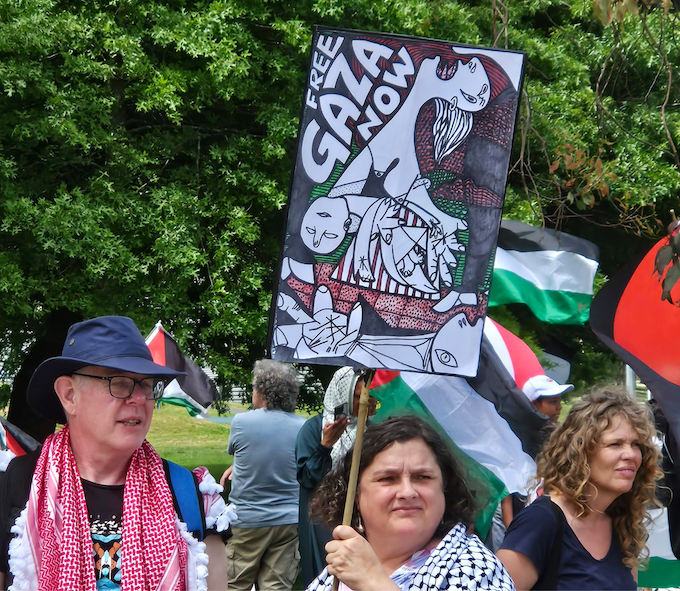
The statement said evidence gathered from victims, eyewitnesses, and international law provisions indicated that Israeli military and political leaders were directly responsible for ordering and carrying out attacks on hospitals, aid convoys, and civilian infrastructure.
Citing specific incidents, the Prosecutor’s Office referred to the killing of six-year-old Hind Rajab by Israeli soldiers, the bombing of al-Ahli Arab Hospital that killed more than 500 people, and the strike on the Turkish-Palestinian Friendship Hospital, among other atrocities.
Turkiye has issued arrest warrants for Israeli PM Benjamin Netanyahu and other senior officials, accusing them of ‘genocide and crimes against humanity’ over Israel’s war on Gaza https://t.co/ijOfz1wZSF pic.twitter.com/34UJIQosKR
— Al Jazeera English (@AJEnglish) November 8, 2025
Additional war crimes
The office said that the investigation determined Israel’s blockade of Gaza had “deliberately prevented humanitarian assistance from reaching civilians,” constituting an additional war crime under international law.
The suspects, including Netanyahu, Defence Minister Israel Katz, National Security Minister Itamar Ben-Gvir, Chief of General Staff Herzi Halevi, and Navy Commander David Saar Salama, were accused of “genocide” and “crimes against humanity.”
As the individuals are not currently in Türkiye, the Prosecutor’s Office requested the court to issue international arrest warrants (red notices) for their detention and extradition.
The investigation is being carried out with the cooperation of the Istanbul Police Department and the National Intelligence Organization (MIT), and it remains ongoing.
The statement concluded that Türkiye’s legal actions are based on its obligations under international humanitarian law and the United Nations Convention on the Law of the Sea, affirming the country’s commitment to accountability for war crimes and justice for the victims in Gaza.
Last November, the International Criminal Court (ICC) issued arrest warrants for Netanyahu and his former Defence Minister, Yoav Gallant, for war crimes and crimes against humanity in Gaza.
Israel also faces a genocide case at the International Court of Justice for its war on the enclave and Türkiye has joined South Africa and other countries in bringing the allegations.
In Tel Aviv, Foreign Minister Gideon Saar said Israel “firmly rejects, with contempt” the charges, calling them “the latest PR stunt by the tyrant [Turkish President Recep Tayyip] Erdogan”.
A fragile ceasefire has been in force in the devastated Palestinian territory since October 10 as part of US President Donald Trump’s regional peace plan.
The Islamist militant group Hamas welcomed Türkiye’s announcement, calling it a “commendable measure [confirming] the sincere positions of the Turkish people and their leaders, who are committed to the values of justice, humanity and fraternity that bind them to our oppressed Palestinian people”.
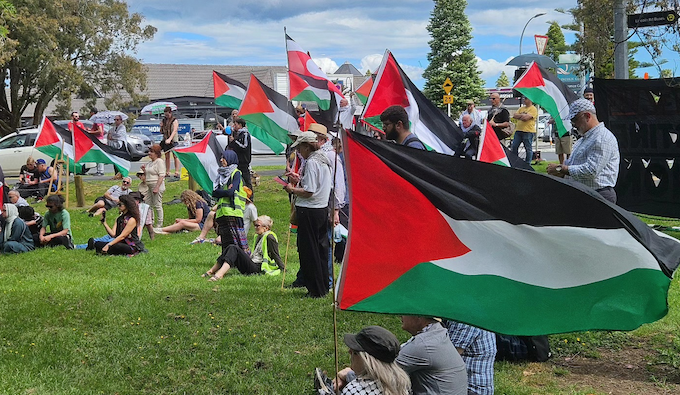
This post was originally published on Asia Pacific Report.